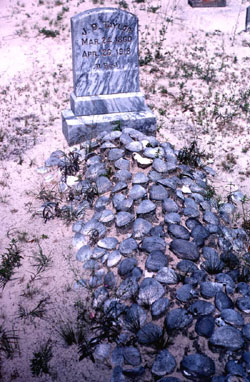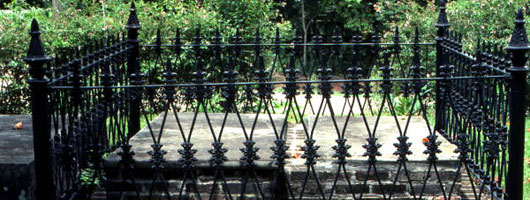What are the rights and responsibilities of landowners?
Cemetery Ownership
Cemeteries are in all types of ownership:
- public ownership by municipalities, counties, states and the federal government
- private ownership by organizations that manage cemeteries, such as corporations and churches
- private ownership of abandoned and neglected cemeteries that are no longer active
Each type of ownership involves different levels of protection and management, ranging from active use as a legal cemetery, to cases where a landowner does not even know that a cemetery is on his or her land. The most important point to remember is that all human remains are protected under state law, no matter who owns the land. The county property appraiser at the county courthouse can help you find out who owns a specific lot or land parcel. For some counties, this information is available online.
 Most cemeteries in public ownership are protected and maintained, although many are no longer actively receiving new interments. If there is a problem with a cemetery on public land, the primary point of contact will be the public land manager or responsible public official. In some cases privately owned and maintained cemeteries exist within the boundaries of publicly owned land.
Most cemeteries in public ownership are protected and maintained, although many are no longer actively receiving new interments. If there is a problem with a cemetery on public land, the primary point of contact will be the public land manager or responsible public official. In some cases privately owned and maintained cemeteries exist within the boundaries of publicly owned land.
Most active cemeteries are under the management of cemetery corporations, or religious and not-for-profit organizations. Active cemeteries of this type are regulated by the Florida Division of Banking and Finance. Sometimes, cemeteries that were once under the management of a business or a church become abandoned when the original organization is no longer viable. Commercial cemeteries sometimes go out of business with no provision for future care, and churches can move as a congregation but leave a cemetery behind. There are many opportunities for disturbance and destruction of graves when no party is responsible for care.
Finally, land in private ownership may contain graves, sometimes in the form of a homestead or family cemetery that is known and maintained, but more often as an abandoned or neglected cemetery that is unknown. In some cases, headstones may have been removed illegally, but human graves still exist below the ground. Many disputes arise over access by descendants to graves on private land.
Here are some principles regarding ownership:
- all human remains receive equal protection under Florida law, regardless of land ownership
- land owners are prohibited from disturbing human remains and graves on their land
- relatives and descendants have certain rights of access to cemeteries on private land
- relatives and descendants may request the private landowner to provide reasonable maintenance
- relatives and descendants have a right to maintain a cemetery if the landowner fails or refuses to do so
- if there is a dispute about access or maintenance, contact local law enforcement and direct them to this web page
- the State Archaeologist has no responsibility or authority concerning access or maintenance of marked or previously marked graves; contact local law enforcement instead


